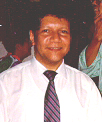

AS we gain another year of
national maturity, we should take cognisance of the reality that united we
prevail, divided we fall. What we are celebrating is unity in diversity.
Each year our national monuments and icons grow in number, variety and function.
Each year during National Day, we have the opportunity to review the substance
of our nationhood in all fields.
And what of the substance of our nationhood in education?
Under one flag, over five million school children sing Negara Ku each week. Like
the generations before, the young create and cherish schoolday memories moulded
by sound and sight, fun and feelings, failures and successes.
Collectively, over three quarters of the population have gone through the
education system which has the national language as the main medium of
instruction, a common curriculum, co-curriculum activities according to
institutional capacities, common public examinations, common textbooks, common
teacher education, common school uniform, common school calendar year, and
common laws, policies, procedures, rules and regulations.
Under these educationally-constructed ways, schooling experiences in Malaysia
would be relatively uniform. The uniformity aims to foster equal educational
opportunities while fostering a collective experiential national memory Ñ a
oneness and sense of belonging among all Malaysians.
There is also recognition of individual differences and merits. The challenge is
to further allow more diversity and the exploration of the talents and multiple
intelligences of pupils.
Co-curriculum activities encompass programmes in uniformed units (Scouts, St
John Ambulance /Red Crescent, Cadets, Scouts and Girl Guides), clubs and
societies, sports and athletics.
Students are provided with opportunities to acquire skills and enjoy the
recreational life by involvement in activities ranging from learning pantun,
dikir barat, dance, silat and debates, to outdoor activities and sports such as
the high jump and tennis.
The challenge is to foster inclusiveness.
While the education system has contributed significantly to nation-building,
there remain many weaknesses which must be addressed.
The education system must upgrade the knowledge competencies and qualifications
of its members within the shortest period of time.
There is the urgent need to combat bigotry, extremism of all kinds, educated
ignorance, evil disguised as good, wrong knowledge, misplaced priorities,
misinterpretations of religious teachings, chauvinism, disregard for human
dignity, and the madness for power to rule those whose cultures are different
from ours.
Although those who uphold dangerous missions in society are small in number,
their actions are potentially destructive enough to destabilise the social order
and cause misery.
Somewhere in the education and socialisation of these few people, there are the
seeds of anarchy, misguidance, wrong, erroneous or confused knowledge and
distorted values.
The challenge for education is to provide the balance and idealism that will
sustain a democrative society that is respectful of the rights of others.
The spirit of nationalism and patriotism calls for individual sacrifices for the
nation.
As the nation gives to its citizens, so must its citizens be willing to give to
the nation. This is the measure of true patriotism.
The sacrifices required take different forms during times of war and peace.
In this age, what is required of every citizen is to develop to one's fullest
potential to ensure individual resilience and the creation of a knowledge
society.
One of the significant quests for independence, national sovereignty and pride
is to ensure that Malaysia truly becomes a centre of educational excellence.
The challenge is to create a reading and knowledge culture, and a nation of
life-long learners.
The new nationalism or patriotism is not about annexing other countries or
oppressing other people and making them our subjects. It is about advancing
human rights and human dignity through our institutions, particularly through
our educational institutions.
It is through knowledge mastery that the nation can assert its intellectual
independence from the dominant traditions.
The new meaning of independence goes beyond indigenisation, Malaysianisation,
Islamisation or Christianisation.
This demands a boldness to accept knowledge without resorting to the rhetoric of
politics.
True independence is when each citizen takes responsibility for building the
nation.
It is about fighting ignorance, reducing poverty, eliminating diseases, opposing
oppression, righting wrongs, and raising the quality of life.
It is also about taking responsibility to build the global community and
contribute to the betterment of humanity. This should be our patriotic quest.
As we celebrate yet another year of independence, we must ponder on how to act
boldly and effectively to further ensure national integration and unity.
As a nation under one flag, we are bonded by common historical memories and
inspired by a common vision. Based on our collective national accomplishments,
we can take pride in our nation with all its glories and failings.
Resolve to meaningfully contribute towards nation-building initiatives and in so
doing, contribute towards civilisation-building.